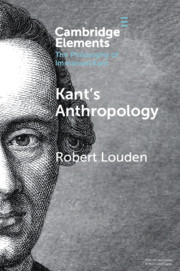Element contents
Anthropology from a Kantian Point of View
Published online by Cambridge University Press: 15 February 2021
Summary
Keywords
- Type
- Element
- Information
- Online ISBN: 9781108592871Publisher: Cambridge University PressPrint publication: 11 March 2021
Bibliography
Sources
- 2
- Cited by



